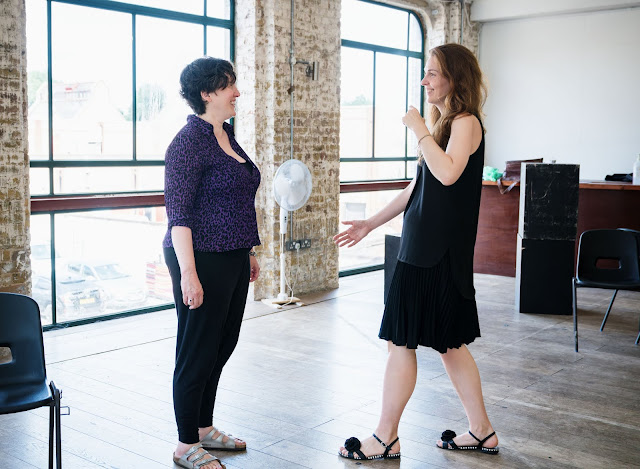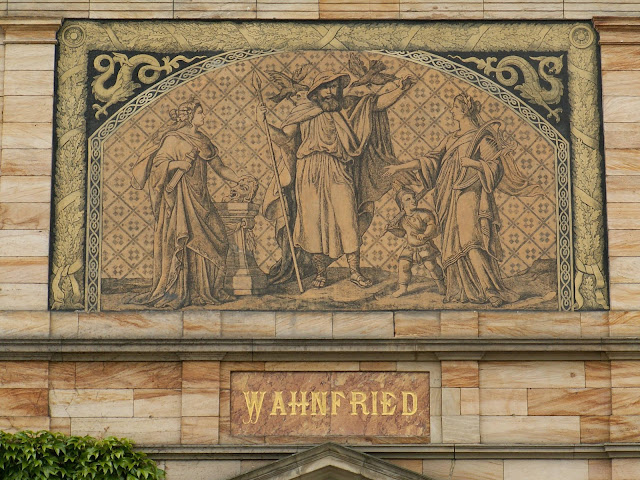 |
| Holden Madagame as Mime in Wagner's Das Rheingold with Regents Opera in 2022 |
Regents Opera's production of Wagner's Siegfried as part of its ongoing Ring Cycle conducted by Ben Woodward and directed by Caroline Staunton opens at the Freemasons Hall, London, WC2B 5AZ on 4 February 2024 with further performances on 7 and 10 February. Here transgender tenor Holden Madagame talks about their transition from mezzo-soprano to tenor and the importance singing Wagner holds for them.
A few years after I came out as transgender, I sang for Ben Woodward, out of interest, in Regents Opera’s (then Fulham Opera’s) orchestral workshops. I had been on testosterone for about three years and was finally starting to come into my tenor voice after having trained as a mezzo-soprano at the University of Michigan. About seven years later, I continue to work with them and am debuting as Mime in their Ring Cycle.
.jpg) |
| Holden Madagame as Mime in Wagner's Das Rheingold with Regents Opera in 2022 |
Transitioning from the gender of lyric mezzo to the gender of character tenor has been an interesting journey and has taught me a lot about the inherent stereotypes that our Fachs possess. I find that I’m often in a unique position to observe this, having seen multiple sides of this experience myself. At first I found this difficult, as I actually enjoyed singing as a mezzo-soprano, but over time I have come to deeply appreciate the nuance and skill of my Fach. Singing Wagner has been crucial to this.
The parallels with who I am as a queer, transgender, indigenous [Native American, Odawa which is part of the Anishinaabe nation in the mid-west of the United States and Canada.] person and who I play on stage is not lost on me. My characters very often reflect the way that the world views me, which is as a character, a clown - strange, bewildering, entertaining, pitiable, cute, and/or fun. It has taken a lot of grace and self-awareness to retain my self-confidence while playing these types of roles.
Most roles that I sing are a maximum of about 25 minutes long. These are generally supporting roles that require precision, energy, excellent diction, and comedic timing. Although there is a long tradition of character tenor being a legitimate Fach, colleagues often describe them as ‘thankless’ and generally less respected. The roles themselves are also, I’m sad to say, often racist, sexist, homophobic, and/or ableist. The antisemitism baked into Mime should also be acknowledged, as this awareness can help us create modern interpretations of Wagner’s works without unintentionally perpetuating antisemitism.
Mime from Siegfried is roughly five times larger than any role I have sung thus far, and absolutely the largest character role in all operatic repertoire. It is challenging, has a large vocal range both in tessitura and in the variety of colours that are written into the score, and emotionally much deeper than your average character role. Even in Rheingold we only get a glimpse of Mime’s complexity, and that is still considered a significant character role. Mime is an excellent example of a role that is neither easy nor meant for a singer without this specialism. Without the proper attention to the text, a sophisticated vocabulary of movement and acting choices, and the knowledge that it should not be sung ‘beautifully’, it has the potential to be the most boring role in the opera.
Something that significantly differentiates Regents Opera for me from other companies that I have worked with is the respect that all roles get. Each role is cast thoughtfully and each singer respected for the type of work they do. Working with director Caroline Staunton is an absolute pleasure, as she takes character roles very seriously and does not take any moment, piece of text, or opinions from her singers for granted. I have been able to use my natural impulses, which involve humour, surrealism, and grotesqueness, to create a well-rounded character that is not only psychologically troubling but in many ways relatable to the audience.
On 4 February at the Freemason’s Temple in London, I will (to my knowledge) be the first transgender person to have sung Mime in Siegfried. This is a milestone not just for me, but for transgender opera singers around the world. My existence gives other trans singers hope in a very concrete way, and I’m thankful for the privilege and support to be able to exist this way in the world while making excellent music.
Full details of Regent Opera's Ring Cycle from the company's website.













.jpg)

.jpeg)





.jpeg)